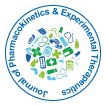开放获取期刊获得更多读者和引用
700 种期刊 和 15,000,000 名读者 每份期刊 获得 25,000 多名读者
抽象的
The Role of ABC Efflux Transporter in Treatment of Pharmaco-Resistant Schizophrenia: A Review Article.
Alemayehu D, Melisie G, Taye K and Ta
A large percentage of schizophrenic patients respond poorly to antipsychotic treatment. This could be explained by inefficient drug transport across the blood-brain barrier due to ABC efflux transporter, in particular, P-glycoprotein, mediated efflux. P-glycoprotein (P-gp) activity and expression in the blood-brain barrier can be affected by genetics (polymorphism), inflammation and pharmacotherapy. The level of expression of P-gp at BBB is thought to be one of the factors contributing for pharmaco-resistant schizophrenia. Despite the differences in the experimental set-up that partly explain the controversies regarding the interaction between P-gp and antipsychotics, it is feasible to say that the majority of the antipsychotics have shown (mostly weak) affinity as a P-gp substrate and that most have a weak inhibitory effect on P-gp in vitro. The three major Single Nucleotide Polymorphisms (SNPs) in protein coding region at C3435T, G2677T, and C1236T of ABCB1 at BBB have been associated with efflux pump efficiency and with predicting changes in the function of P-gp that determines the inter-cerebral concentration and therapeutic response in human studies to anti-psychotics unlike serum concentration of these agents.

 English
English  Spanish
Spanish  Russian
Russian  German
German  French
French  Japanese
Japanese  Portuguese
Portuguese  Hindi
Hindi